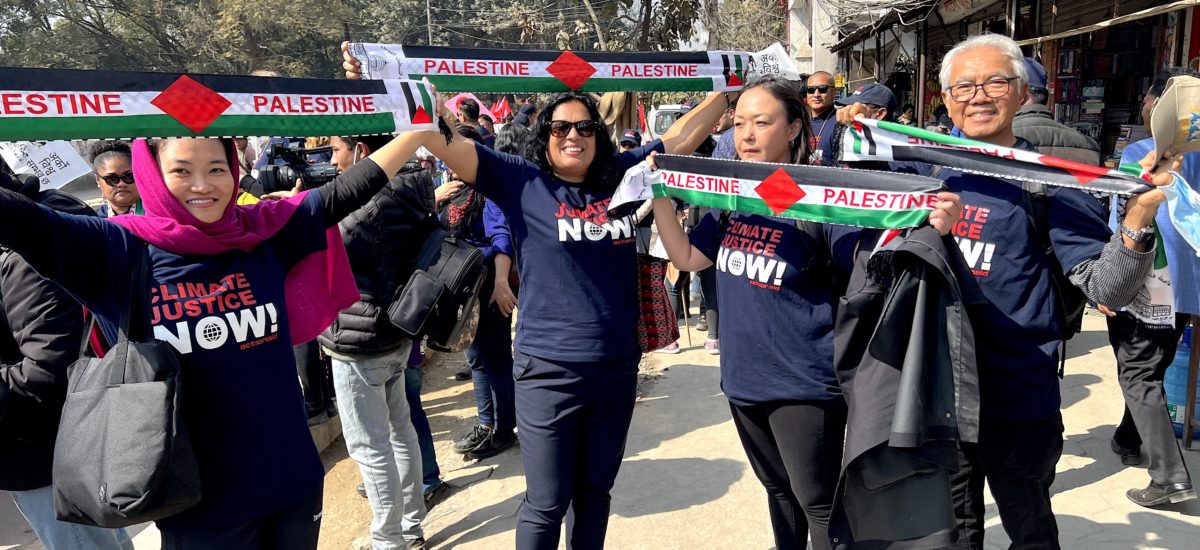Photo courtesy World Social Forum
The prospect of a full ground invasion in Rafah, Gaza, and the potential of the forcible transfer of more than 1.5 million people looms large like a dark and sinister cloud. Images of children scooping flour up with their hands and hurriedly shoving it in their pockets symbolizes the desperation and the thread of life many are surviving on in a now completely aid dependent context experiencing severe famine.
Yet amid all of this despair, my recent participation in the World Social Forum in Kathmandu, Nepal last week reinforced the belief that there is so much solidarity still within the world and a deep connected sense of humanity. The main protest march at the World Social Forum was captured in chants of “Free Free Palestine”, “Rise for Freedom” and “Rise for Justice”. The streets of Kathmandu echoed with the spirit of resistance and the refusal to give in. People from all corners of the world gathered at this event, with the intention of demonstrating people power; social movements, grassroots activists, human rights defenders, networks of campaigners and individuals working on various issues stepping forward to share their struggles, working to prove that another world is possible.
The most moving moment was the sight of those who travelled from the West Bank, freely demonstrating and raising their voices on the street. Free from fear – from the fear of arrest, from the fear of violence and free from subjugation even for just a few precious days. Their spirits were able to recharge with the feeling of dignity that being able express yourself gives you. People who, until they left their country, believed that the world had abandoned them to a fate worse than hell; instead, feeling and experiencing much needed solidarity, love and comradeship from corners of the world they never imagined. They return to Palestine knowing that despite everything, they are not alone.
With the spotlight being on the Asia region, there was much to deliberate it produces over 50% of the world’s global greenhouse gas emissions, contains 60% of the world’s women and young people, 67% of the world’s indigenous peoples and 37% of the world’s poor. Kathmandu took center stage in a call for strong collective action and grassroots activism to give a voice to the people living in exclusion and various forms of marginalization whilst focusing on combatting shrinking democratic space including digital spaces and platforms. Thematic discussions were set up on gender inequality, systematic discrimination, endemic poverty and economic inequality, social exclusion and the promotion of a just feminist transition.
Activists from Sri Lanka, the Pacific, Latin America, Palestine, Myanmar and many other places where the population is suppressed by authoritarian regimes gathered to reflect on the global trend towards the rise of populist governments who are coming into power across all continents, undermining the principles and values of democracy. The authoritarian and sometimes violent character of these governments, coupled with the constant fighting among the superpowers and the endurance of an unjust market structure that maximizes profits during times of global crisis, is creating a despairing new global world order. Military solutions and violence are used as first responses in divergences and disputes among nations, leaving aside negotiation and dialogue and the marginalized communities most affected.
Thirty five thousand people gathered to reaffirm their commitment to work with communities, people’s organisations, youth and women’s movements, groups and networks, social movements and other allies to overcome the structural causes and consequences of poverty and injustice while promising to connect the work being done at the community level with broader efforts and struggles for justice and commit to engage in movements and campaigns at national, regional and global levels to make the greatest contribution towards a just, equitable and sustainable world.
Believing that change is possible and rooted in the individual and collective empowerment of those most affected to know, claim, defend and enjoy their rights over the long term, we committed to ensure deepened democracy, meaningful participation and campaigning for just and credible alternatives and strengthening work that collaborates with movements and coalitions sustained by global solidarity and committed supporters.
In Kathmandu, we reaffirmed that people power was our greatest resource to achieve our ambitions, highlighting the need to ensure collective efforts and struggles through empowerment, solidarity, campaigning and common cause between communities, people’s organisations, social movements and citizen’s groups to strengthen the power of people to drive for change in Gaza as well as to bring transformation in Myanmar, Syria, Afghanistan and other countries where rights are in crisis and the duties of assistance and protection are disregarded.
As a global movement, we are fighting against systems of injustice that view black, brown and indigenous peoples as disposable, to be sacrificed by racist and colonial systems of exploitation and domination. The struggle of the Palestinian people against occupation and apartheid is part and parcel of our collective struggle for climate, racial, economic and political justice and for a world where everyone has the right to live with dignity, free from oppression.

